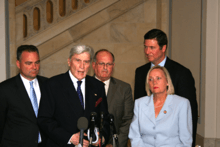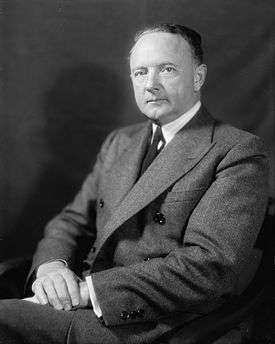Politics of Virginia

The politics of Virginia reflect a state that is beginning to experience a conflict between its increasingly liberal northern region and its traditionally conservative southern region.[1]
History

After the American Civil War (1861–1865), Virginia was in political turmoil. 48 former counties now in West Virginia were gone, soon to be joined by two more. The Commonwealth of Virginia unsuccessfully appealed to the U.S. Supreme Court.
After U.S. Senator William Mahone and the Readjuster Party lost control of Virginia politics around 1883, white Democrats regained the state legislature. They proceeded to use statute and a new constitution in 1901, with provisions such as a poll tax, residency requirements, and literacy test to disfranchise most African Americans and many poor whites. Their disfranchisement lasted until after passage of civil rights legislation in the mid-1960s.
White Democrats created a one-party state, with a nearly unchallenged majority of state and most federal offices through the middle of the 20th century. The Byrd Organization headed by Harry F. Byrd Sr. largely controlled statewide politics. Through their leadership and activism in the Civil Rights Movement, African Americans gained national support for passage of the Civil Rights Act of 1964 and the Voting Rights Act of 1965, which provided Federal oversight and enforcement to maintain all citizens' ability to vote. Under Section 5 of the Voting Rights Act, decisions affecting elections are subject to preclearance by the U.S. Department of Justice before they can take effect.
Recent events
Jim Gilmore's "no car tax" pledge was emblazoned on bumper stickers and yard signs across the state.
In 2007, Virginia driver fees legislation created a political uproar when residents realized that they faced $3,000 fines for certain moving violations. An online petition quickly gathered hundreds of thousands of signatures, spurring legislators up for re-election that November to reconsider their positions. This was the first time that the Internet played such a dramatic role in influencing Virginia politics.[2]
Criticism
Dozens of delegates run unopposed each election cycle, which led 2001 Libertarian gubernatorial candidate and former national LP chair Bill Redpath to conclude that "Virginia has a democracy that is uncompetitive and boring."[3] A proposal was made to shake up the system by replacing the 40 single-member state Senate districts with 10 four-member at-large districts, which could allow a mix of urban Republicans and rural Democrats, as opposed to the urban Democrats and rural Republicans typically elected by the current system; this could also make it easier for an occasional independent or third-party candidate to win election.
Statewide referenda
In 2006, a statewide referendum on the Marshall-Newman Amendment added a provision to the Bill of Rights of the Virginia Constitution banning gay marriage; it passed with 57% of the vote.
See also
References
- ↑ "Inoljt" (2010-08-10). "Analyzing Virginia’s 2009 Gubernatorial Election, Part 1". My Firedoglake. Retrieved 2013-01-11.
- ↑ Va. Driver Fees Now Election Weapon, Tim Craig, The Washington Post, July 17, 2007.
- ↑ Bill Redpath, Libertarian Candidate for Virginia Governor, The Washington Post, Oct. 12, 2001.
External links
| ||||||||||||||